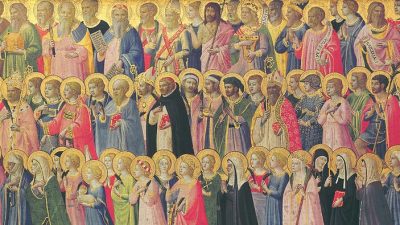 Readings:
Readings:
Revelation 7:2–4, 9–14
Psalm 24:1–6
John 3:1–3
Matthew 5:1–12
The first reading focuses us for today’s solemnity. In the Book of Revelation, St. John reports “a vision of a great multitude, which no one could count, from every nation, race, people, and tongue.”
This is Good News. Salvation has come not only for Israel, but for the Gentiles as well. Here is the fulfillment of God’s promise to Abraham, that by his seed all the nations of the world would bless themselves (see Genesis 22:18).
The Church celebrates many famous Christians on their individual memorials, but today she praises God for all His “holy ones,” His saints. That is the title St. Paul preferred when he addressed his
congregations.
Divinized by Baptism, they were already “saints” by the grace of God (see Colossians 1:2). They awaited, however, the day when they could “share in the inheritance of the saints in light” (Colossians 1:12).
And so do we, as the Scriptures give us reasons for both celebration and hope. In our second reading, St. John tells us that to be “saints” means to be “children of God”—and then he adds: “so we are”! Note that he speaks in the present tense.
Yet John also says that we have unfinished business to tend. We are already God’s children, but “what we shall be has not yet been revealed.” Thus we work out our salvation: “Everyone who has this hope based on him makes himself pure, as he is pure” (1 John 3:3).
We do this as we share the life of Christ, who defined earthly beatitude for us. We are “blessed,” He says, when we are poor, when we mourn, when we are persecuted for His sake. It is then we should “Rejoice and be glad, for [our] reward will be great in heaven” (Matthew 5:12).
Until then, we pray with the Psalmist: “Lord, this is the people that longs to see your face.” Salvation has come through Abraham’s seed, but it belongs to all nations. For “the Lord’s are the earth and its fullness; the world and those who dwell in it” (Psalm 24:1).